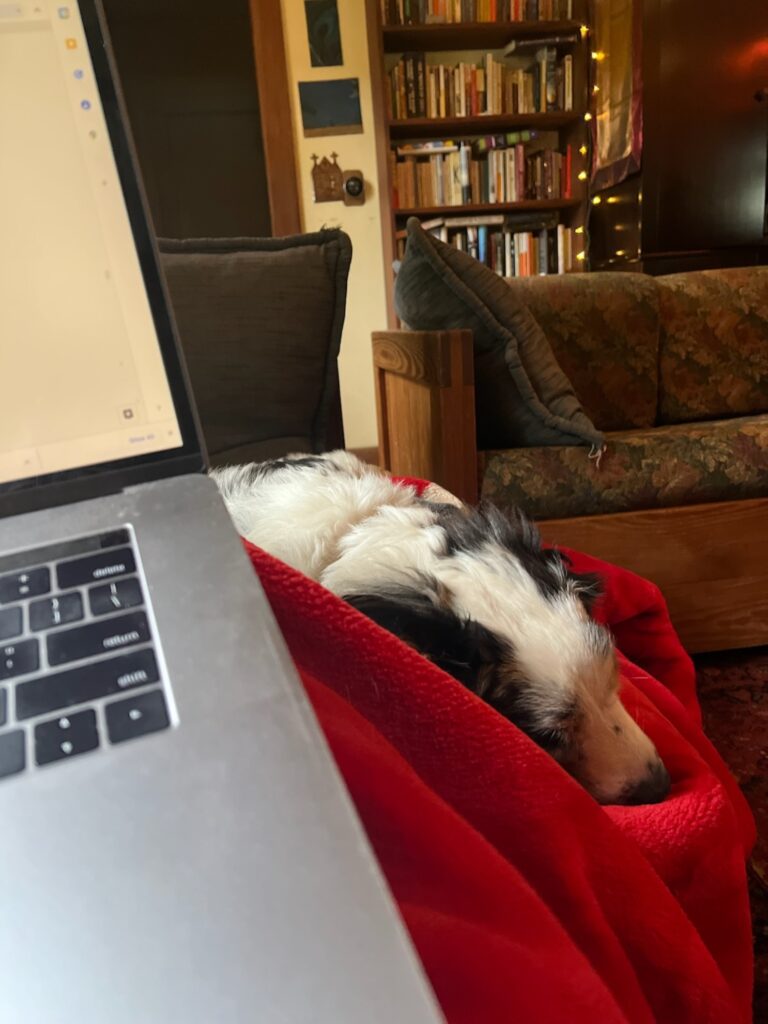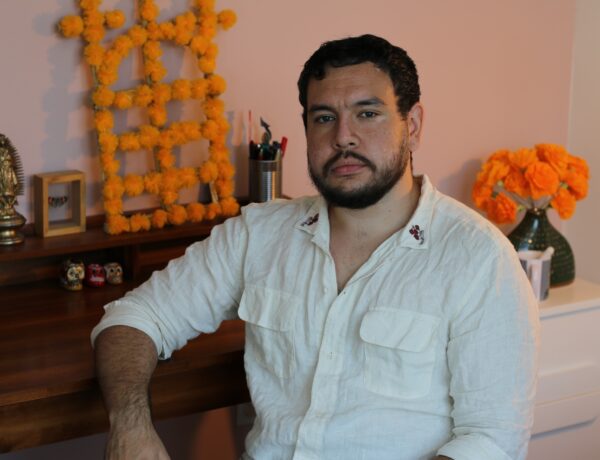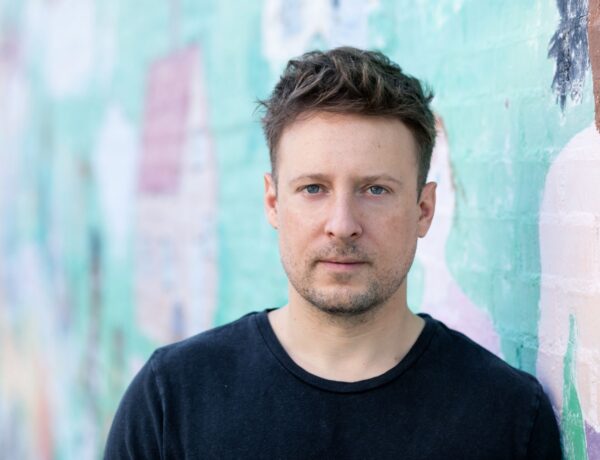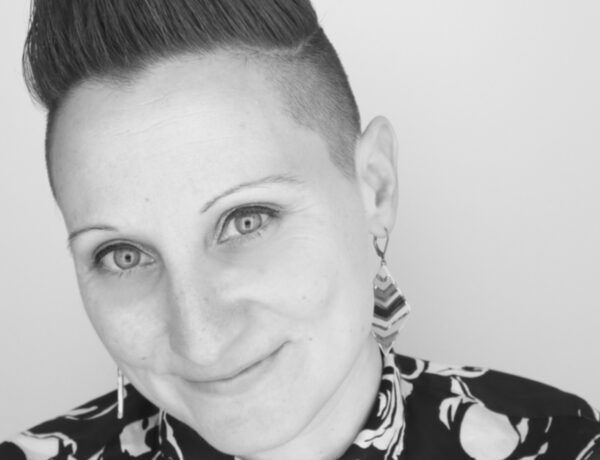Michelle Dowd is a journalism professor and contributor to The New York Times, The Los Angeles Book Review, The Alpinist, Catapult, and other national publications. She is Faculty Lecturer of the Year for 2022 at Chaffey College, where she founded the award-winning literary journal and creative collective, The Chaffey Review, advises Student Media, and teaches poetry and critical thinking in the California Institutes for Men and Women in Chino.
She has been recognized as a Longreads Top 5 for her article on the relationship between environmentalism and hope in The Alpinist, nominated twice for the Pushcart Prize, and profiled on the second season of Sincerely X, a TED production for stories too risky, painful, or controversial to be shared on the stage. Her popular Modern Love column in The New York Times inspired a book contract.
Michelle was raised on a mountain in the Angeles National Forest where she learned to identify flora and fauna, navigate by the stars, forage for edible plants, and care for the earth. As an Experienced Registered Yoga Teacher, she has been teaching students and training teachers in southern California studios since 2008, as well as teaching yoga to employees at local businesses and leading Yoga on Tap at Claremont Craft Ales.
Michelle’s first book, Forager: Field Notes on Surviving a Family Cult, a memoir forthcoming with Algonquin Press, showcases her life growing up on an isolated mountain in California as part of an apocalyptic cult, and how she found her way out of poverty and illness by drawing on the gifts of the wilderness.
Hi Michelle! We’re delighted to have you as a guest on Famous Writing Routines. For our readers who may not be familiar with your work, could you please give us a brief introduction to yourself?
I work as a journalism professor, writer and yoga teacher. I’m also a mother of four, grandmother of one, and caretaker of four Australian Shepherds and hundreds of trees, all of which influenced how I wrote my first book, Forager: Field Notes for Surviving a Family Cult.
Can you tell us about your background growing up on a mountain in the Angeles National Forest and how it influenced your writing and connection to the natural world?
My unusual upbringing has influenced everything about my life, including my writing. I spend time alone in nature every week, no matter where I am, whether that’s backpacking in the wilderness, or simply sitting under a tree in a park or looking at a sunset on a walk.
For most of human history, we have lived inside of and interdependent with the natural world. According to the book Sapiens, our human ancestors were foragers for about 2 million years. As homo sapiens, we were foragers for the past 200,000-250,000 years. It was only 11,000 years ago that we began to develop agriculture, which slowly changed our relationship to the land and led to our current obsession with ownership, including the ownership of women.
For 95 percent of our time on Earth, we humans have sustained ourselves by foraging for food from the natural environment we inhabit. We can be comfortable in nature, because it’s who we are. No matter how much we pave over the earth, we become calmer when we look at a tree. We become calmer when we sit next to bodies of water. We become calmer when we look at sunsets. This is in our DNA. We don’t feel rooted and grounded unless we are in direct relationship with nature.
Your Modern Love column in The New York Times inspired a book contract, can you tell us more about the column and how it came to be?
As a way of encouraging my college students to get out of their comfort zones and take risks, I asked them to collect rejection slips over winter break. I asked them to write toward what makes them uncomfortable. And since I practice what I preach, in early 2020, I wrote about a relationship that felt unresolved and shameful and submitted it to the notoriously selective Modern Love column.
As I unraveled why I had loved someone who couldn’t love me, I was taken back to the mountain of my youth. The man in question stood in for the home I couldn’t go back to. I knew it wouldn’t be published, but the point of the exercise was to retrieve a rejection slip. A week later, Dan Jones called me to discuss the piece. A week after that, my essay appeared in the Times.
What does a typical writing day in your life look like?
I try to write first thing in the morning, before I talk to anyone. I prefer to rise in the dark and write by candlelight. Managing time is my greatest challenge. Everything I do keeps me up until all hours, but I don’t resist this. I don’t know the last time I’ve slept through the night–so I use this as a working tool. The only way I have been able to prioritize writing is by committing to it very early in the morning.
I wrote Forager in four months, before the sun came up, literally by candlelight, mostly pen on paper. Not that the candlelight was necessary, but lighting candles in the dark was the way I put myself into a sacred space. I edited on a computer later in the day, but generating the creative work took place in the liminal hours before sunrise.
How do you balance your responsibilities as a journalism professor and your role as a writer?
I try to give my creative work the first hour of my morning. After that, during the week, my students’ needs come first. That being said, meeting my students’ needs has also taught me a lot about writing. Preparing lectures, answering their questions, and reading and grading their work has given me years of practice with how to tell stories, as well as practice processing my thoughts through my fingertips. When I didn’t have confidence in sharing my story, I was able to practice what I teach my students, which is that our first commitment is to write a story well. Everything else comes later.
Can you tell us about your experience with the writing process of your upcoming book, Forager: Field Notes on Surviving a Family Cult?
I’ve read and journaled obsessively throughout every era of my life, but I didn’t write with any eye toward publishing until 2018, when I committed to writing a blog entry every week for a year before I sent anything out to publishers. After that, when I was ready to send pieces out, I was very fortunate to find editors receptive.
Every role I play has contributed to my ability to organize this story. In early adulthood, I taught college while pregnant and breastfeeding, and ever since, I’ve been juggling my time– as a mother, full-time professor, yoga instructor, partner, sister and friend. But honestly, I think each role has benefitted from the others.
While I feel like my career as a writer is just beginning, I’ve been writing since I was a young child, on every scrap of paper I could find. I’m a kinesthetic learner, and I’ve spent my life processing my thoughts through my fingertips, meaning, I don’t know what I think until my fingers write it down. When I was a teenager, my dad wanted me to have a marketable trade, so he gave me a typewriter, so I could earn a living transcribing the letters of businessmen. Instead, I played on that typewriter like a pianist. And I’ve been playing ever since.
How do you approach writing about sensitive and controversial topics?
My family taught me to never, under any circumstances, talk publicly about sensitive or controversial topics. This has been a huge challenge to overcome. When I think about the difference between secrecy and privacy, I think about who gets to choose what they share.
Where I come from, we weren’t supposed to question, let alone criticize, any aspect of the fundamentalist organization to which we belonged, and we weren’t allowed to talk about our experiences. What the leaders told us, and the teachings and practices they required were all about obedience. For instance, we had rituals on the Trip that required first timers to be slaves, while those of us who were veterans of Trips were Masters, and the slave would literally call us Master and would have to do anything we said.
Being a fundamentalist is about certainty and secrecy. Certainty and secrecy are dangerous because they don’t allow for growth, change, resilience, or interdependence, which happen to be all the things that nature teaches us. My stories come from a place of questioning and sharing my questions. I do my best to keep an open mind when I write, and to leave space for the reader to do so as well.
What does your writing workspace look like?
I think the picture shows this perfectly. I write on the couch, mostly lying down, usually surrounded by dogs.

Affiliate disclaimer: Some links on this website are affiliate links. We may earn a small commission if you make a purchase through these links, but only promote products we truly believe in. We disclose affiliate links and give honest reviews.



No Comments